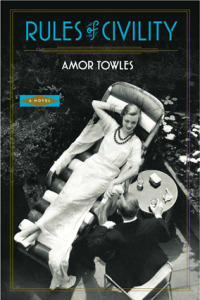A Gentleman in Moscow by Amor Towles
 Wednesday, March 22, 2017 at 9:33AM
Wednesday, March 22, 2017 at 9:33AM 
Published by Viking on September 6, 2016
A Gentleman in Moscow is an exercise in elegance. Everything about it is elegant: the characters, the hotel where the novel takes place, and most of all, the prose. Take this sentence: “He said that our lives are steered by uncertainties, many of which are disruptive or even daunting, but that if we persevere and remain generous of heart, we may be granted a moment of supreme lucidity — a moment in which all that has happened to us comes into focus as a necessary course of events, even as we find ourselves on the threshold of the life that we had been meant to lead all along.” This is a story that, for most of the novel, seems to be about one thing, and it suddenly becomes something else — the story it was meant to be all along.
In 1922, Count Alexander Rostov appears before the People’s Commissariat for Internal Affairs and is asked whether his return to Moscow from Paris in 1918 was motivated by a desire to take up arms against the revolution. With charm, Rostov claims to be too old to take up arms against anything. The Party concludes that Rostov has succumbed to the corruptions of class but, instead of putting him against a wall to be shot, he is placed under house arrest in the Metropol Hotel, in recognition of his poetic service to the prerevolutionary cause. As a Former Person, Rostov must vacate his former Metropol suite and relocate to a small room that will not hold all of his possessions.
We eventually learn of Rostov’s past, the reason he left Russia, and the reason he returned, but for the most part, we watch Rostov’s life unfold over decades in the Metropol. A man of books, newspapers, and conversation (and the lover of a famous actress), Rostov lives a pleasant but uneventful life until he meets a nine-year-old girl named Nina, who offers to teach him the hotel’s secrets if he will explain the rules of being a princess.
As the years pass, Rostov takes a position as head waiter in the hotel’s exceptional restaurant. Nina grows up, and another little girl takes her place. A philosophical friend makes a surreptitious visit after his release from a gulag. Other friendships are forged. Those friendships prove to be integral in the last quarter of a leisurely novel that makes a sudden and surprising turn.
The history of Rostov’s stay at the hotel is a microcosmic history of life in the new Soviet Union, as labels are stripped from wine bottles (thus eliminating class distinctions), as Nina’s faith in the Revolution is tested, as purges and starvation change Russia’s face, as Soviet leaders dictate art and fashion, as censors remove criticism of Russian bread from Chekov’s letters, as the state imprisons those who indulge in free thought. Counterbalancing the bleakness of Soviet rule is a story of hope and perseverence.
A Gentleman in Moscow is a celebration of hotels (not just the Metropol) and food and friendship. But more, it is a celebration of life. Even within the confines of a hotel — especially within those confines, if the hotel is a landmark — life happens. Life is sneaky, Rostov observes. It disrupts routines, it forces change, it gives reason to marvel. “What a world,” Rostov observes, even if he observes only one small part of it inside the walls of the Metropol. And as a friend who experienced the true horror of confinement in Siberia tells him, his captivity and the friendships it has forged have made him the luckiest person in the world.
Rostov is a perfect gentleman, polite, congenial, unselfish, able to converse about nearly any topic. He is one of the most likable characters in modern literature. And Amor Towles is among the most elegant writers in modern literature, capable of spinning exquisite sentences that evoke a full gamut of emotions. He manages to do that exquisitely in A Gentleman in Moscow. On the strength of just two novels, Towles has cemented his position as one of American’s most gifted novelists.
RECOMMENDED
